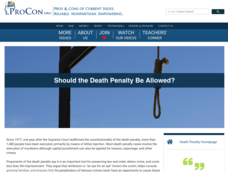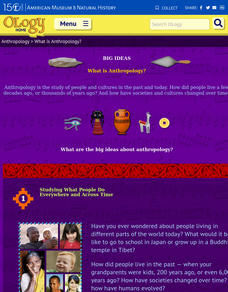ProCon
Social Security Privatization
Should Social Security be privatized, or is the government program fine just the way it is? Scholars read pro and con arguments and watch videos to learn more about the debate topic. Pupils also have an opportunity to interact with other...
Judicial Learning Center
State Courts vs. Federal Courts
Popular culture often portrays the Feds as the most fearsome of law enforcement agencies. Yet, someone charged with a crime is considerably more likely to end up in a state court. The lesson, one of six covering the Organization of the...
ProCon
Gay Marriage
The first legal gay marriage in the United States occurred in Massachusetts in 2004. Since then, countless others have tied the knot. Scholars decide whether gay marriage should be legal by reading a history of the issue, analyzing the...
Judicial Learning Center
The Judge and the Jury
Unless you are a lawyer, you might not understand just how unrealistic Law and Order and other legal dramas actually are. Here's a great resource to help scholars of criminology gain a more realistic perspective. The lesson outlines the...
Judicial Learning Center
Getting Ready for Trial
A courtroom can be a scary place for the uninitiated. Get familiar with the process using a helpful overview of the activities that take place prior to both civil and criminal cases. The lesson explains the differences between...
Judicial Learning Center
Article III and the Courts
What's the best way to make sense of the Constitution? A helpful lesson contains both the text of Article III and annotation of each of its sections, breaking it down into easy-to-understand parts. It also includes links to a...
Judicial Learning Center
The Appeal Process
Why doesn't the Supreme Court hear testimony from witnesses? How do they complete an entire proceeding in less than two hours? A helpful lesson guides scholars of criminology through these and other questions by explaining how appeals...
Judicial Learning Center
About Federal Judges
Not just anybody can do the job of a federal judge, but according to the United States Constitution just about anybody can be appointed. The lesson outlines the process and requirements for becoming a federal judge, focusing on the...
Judicial Learning Center
Your 1st Amendment Rights
Why should classes care about the First Amendment? An engaging lesson serves as a powerful tool for answering just that. As all four cases in the lesson relate directly to freedom of expression in schools, young scholars explore the...
Smithsonian Institution
Western Indian Wars
Why do many Native Americans live on reservations? An interactive resource teaches about how reservations came to be and the tragic history behind Native Americans moving from their lands. Teenagers read passages, view images, and click...
Judicial Learning Center
Your 4th Amendment Rights
Americans love to learn about their rights, especially those that protect them from the government's power to invade their privacy. Young people are especially engaged by this topic. An informative lesson explores four Supreme Court...
ProCon
Death Penalty
Should the United States continue the practice of capital punishment? Scholars set out to answer the question in preparation for a class debate or discussion about the death penalty. They watch videos, analyze charts about death penalty...
Smithsonian Institution
Civil War
Did you know that more than three million people fought in the Civil War? Through artifacts, graphics, and passages class members learn about the stark divide between North and South that led to the war, as well as about the events...
University of North Carolina
Sociology
What exactly does sociology entail? Sociology is a broad field that covers many topics, including culture, mass media, and social movements. A helpful handout prepares scholars for typical writing found in college-level sociology...
Judicial Learning Center
Law and the Rule of Law
We hear a lot about the importance of the rule of law, but most people do not really know what those words mean. The lesson is a webpage that defines the rule of law, explains why it is important in a democratic society and provides...
American Museum of Natural History
Being an Archeologist: Chuck Spencer
Meet Chuck Spencer, an archeologist who studies the Zapotec people who lived in the Valley of Oaxaca, Mexico over 2000 years ago. Spencer shares in print his response to questions posed by kids.
Smithsonian Institution
Spanish American War
Today, Cuba and America sometimes struggle with diplomatic relations, but did you know that America went to war against Spain to free Cuba? Learners examine many interesting facts related to the Spanish American War using an informative...
Judicial Learning Center
Judicial Independence
Most people support the idea of an independent judiciary in theory until they hear about a court case that violates their principles. An informative resource explains why the concept is important. It also provides scholars of criminology...
American Museum of Natural History
What is Anthropology
A colorful resource introduces learners to the four major fields of anthropology: cultural anthropology, linguistic anthropology, biological anthropology, and archaeology. Explanations are provided for what each field studies, the kinds...
ProCon
National Anthem Protests
San Francisco 49ers quarterback Colin Kaepernick refused to stand for the National Anthem in 2016 as a form of protest. Were his actions appropriate? Using the provided website, pupils attempt to decide for themselves by reading the main...
University of North Carolina
Anthropology
Anthropologists ask the question that everyone wants answered: what does it mean to be human? An online handout provides a brief introduction to the study of anthropology and outlines three common types of anthropology writing...
University of North Carolina
Communication Studies
A degree in communications incorporates disciplines such as business, law, and media as well. A writing handout offers prospective communications majors information about what kind of assignments to expect in a typical course....
Goodwill Community Foundation, Inc.
Manners and Etiquette
Learning how to speak Spanish is incomplete if you're not speaking politely! Teach class members the basics of Spanish manners, including perdón, lo siento, and salud to reinforce their conversational etiquette.
Other
Digital.gov: Federal Social Media Accessibility Toolkit Hackpad
This toolkit is intended for government agencies and other organizations to help them evaluate the accessibility of their social media programs. It contains tips, real-life examples and best practices to ensure that social media content...























